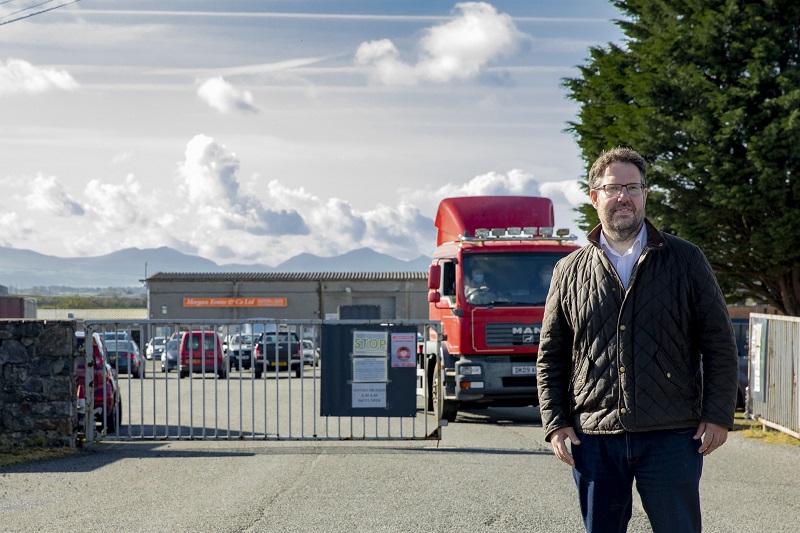
Welsh farmers might need to strap in for a rough ride if the UK’s trade negotiations with the European Union (EU) end in no deal, a leading economist has warned.
But even if a deal can be struck it’s likely to be weighted in favour of the EU and agriculture will find itself a long way down the UK Government’s list of priorities, according to Dr Edward Jones, of Bangor University.
Dr Jones, who works in the university’s renowned Business School but comes from a farming family and is a 2020 Nuffield Scholar, says: “When it comes to the essence of trade deals it’s very simple – the bigger the economy is the more it can dictate the terms of the deal.
“The biggest kids in that playground are the US with an economy worth more than 21 trillion dollars, followed by the EU with 16 trillion and China at 14 trillion.
“The UK economy is sixth at 2.7 trillion but frankly if you’re not in that top three then it doesn’t matter whether you’re sixth or 60th because it’s the big three who account for 60 per cent of the world economy who will call the shots.
“Before Brexit, the EU economy, with a population of about 500 million, was able to negotiate some very successful trade deals in its favour because of its size and the UK did very well out of these deals.
“The UK’s new trade deal with Japan, which is expected short-term to add only 0.07 per cent to the UK economy, commits it to tougher restrictions on state aid.”
Welsh farmers export 40 per cent of their lamb abroad and most of that goes to the EU and Dr Jones says that to lose that market because of a no deal Brexit would be a huge blow to the North Wales rural economy.
Prime Minister Boris Johnson has pledged that the Government will buy all the Welsh lamb in that event but that wouldn’t be sustainable in the future and it remains unclear what he will do with all that lamb.
This comes at a time when the world is struggling to cope with the coronavirus pandemic which along with Brexit has increased uncertainty even in a Welsh food industry that has been a recent success.
Last year saw the industry reveal a record turnover figure of £7.5 billion, surpassing the ambitious target set in 2014 to achieve 30% growth and reach £7 billion of sales by 2020.
This could soon change as 73% of all Welsh food and drink exports went to the EU in 2018 and that post-Brexit market of 447 million people continues to be crucial to the industry even though no deal currently seems the likely outcome.
In that case deals struck elsewhere assume even greater importance and Dr Jones warned: “To lose that EU market would be a huge blow to farmers in North Wales and would be coupled with the necessity of the UK making trade deals elsewhere.
“The pressure would be on the UK Government to strike trade deals with South American nations like Brazil and Argentina – and both can produce agricultural produce that is significantly cheaper than can be achieved in Wales because of their scale and meet current our food standards.
“Protecting Welsh agriculture is not going to be at the top of the list of the Government’s priorities in a trade deal but for negotiators from Argentina and Brazil the chance to break into our markets will be at the top of their agenda.”
It makes for a very uncertain future for Welsh farmers and in that future Cabinet Office Minister Michael Gove has pledged that farmers could be paid subsidy on the basis of their land use and while agriculture is a devolved issue, this is likely to also be the case in Wales.
As Environment Secretary he said farmers should only get paid if they provided a public service, including helping wildlife, catching flood waters on fields, planting woods to soak up carbon emissions and improving the soil.
Dr Jones said: “Agriculture is only worth less than one per cent of the UK economy and employs fewer than 500,000 people but it is very important in many areas of North Wales such as Anglesey.
“We face challenges in terms of climate change and feeding a growing population and farmers can help provide solutions but if farm businesses aren’t financially viable, they won’t be able to help address these challenges.
“It’s possible we could see food production paid for by the free market and farmers paid by the Government for preserving the countryside.
“It is a complex issue providing financial subsidy to agriculture but I would struggle to find a country where farmers aren’t supported either directly or indirectly by their government.”
Dr Jones also highlighted issues that changes in UK immigration policies could have on the agricultural industry: “Even New Zealand agriculture, which has been very successful in recent years in finding new markets in China and South East Asia, depends heavily on immigrant workers,” he said.
“That’s also true in the arable and fruit and vegetable growing areas of England. Although that’s not the case on farms in North Wales it is certainly true in the meat processing sector, which plays an important role in the food supply chain.
“That is a sector that has also been affected by coronavirus, with significant outbreaks seen in Anglesey and Wrexham based meat processing plants.”
For more on Bangor University go to https://www.bangor.ac.uk/